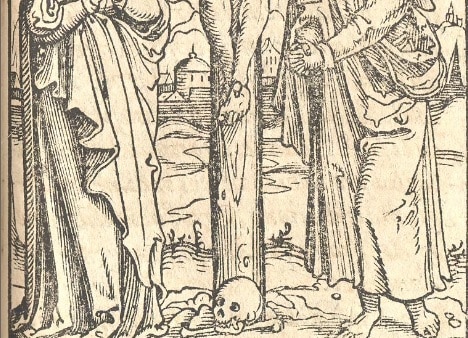GOD’S WORD FOR YOU
1 CHRONICLES 3:17-24
Click to listen to this devotion.
17 The sons of Jeconiah after he was captive were Shealtiel his son, 18 Malkiram, Pedaiah, Shenazzar, Jekamiah, Hoshama, and Nedabiah. 19 The sons of Pedaiah were Zerubbabel and Shimei. The sons of Zerubbabel were Meshullam and Hananiah, and Shelomith was their sister, 20 and five others: Hashubah, Ohel, Berekiah, Hasadiah, and Jushab Hesed. 21 The sons of Hananiah were Pelatiah and Jeshaiah, his son Rephaiah, his son Arnan, his son Obadiah, his son Shecaniah. 22 The son of Shecaniah was Shemaiah. The sons of Shemaiah were Hattush, Igal, Bariah, Neariah, and Shaphat, six. 23 The sons of Neariah: Elioenai, Hizkiah, and Azrikam, three. 24 The sons of Elioenai: Hodaviah, Eliashib, Pelaiah, Akkub, Johanan, Delaiah, and Anani, seven.
In verse 17, there is a little mystery in the Hebrew text that is followed by both the Greek and Latin translations. The verse seems to say, “The sons of Jeconiah: Assir, Shealtiel his son.” But if there is nothing more than a dropped letter ‘h’ (heh), it says, “The sons of Jeconiah after his captivity…” which brings the verse in line with what we read in verse 16 before.
Only two of these names appear in the New Testament, both in the line of the Savior: Shealtiel (Matthew 1:12; Luke 3:27) and Zerubbabel (Matthew 1:12-13; Luke 3:27). Zerubbabel’s name might be familiar to Bible readers; he is mentioned at least twenty times in Ezra, Nehemiah, Haggai and Zechariah, as the prince of the people of Judah after the exile.
Quite a few of these names are among the more popular names in the later books of the Old Testament. There are several men named Berekiah, Hananiah (including one of Daniel’s companions, Daniel 1:6), Shecaniah, and Shimei (Esther 2:5). In fact, notice how few traditional Hebrew names were still in use, apart from the always popular Obadiah (Obadiah 1:1; 1 Kings 18:3-7).
The names in this list are contemporaries of the men in the later part of the genealogy of Jesus. There appear to be about five generations represented here following Jeconiah the king down to the sons of Elioenai. This makes them roughly contemporary to the list of Jesus’ ancestors in Matthew 1:12-13 (assuming no generations are skipped there), and in Luke 3:26b-27 (that is, in reverse order: Josech, Joda, Joanan, Rhesa, Zerubbabel and Shelatiel). In Luke’s list, that leaves fourteen names to account for about four hundred years from the return of the exiles to the birth of Jesus’ grandfather Heli. That means a fairly comfortable four or so generations per century to be covered by the names in Luke (25 years for each man to grow up and have children). If Heli, Jesus’ grandfather in Luke’s Gospel, is in fact the father of Mary and not Joseph (as is generally thought to be the case), then we have a fairly detailed account of our Lord’s blood ancestry in Luke’s Gospel from Adam and Eve (Luke 3:38) through Abraham (3:34), David (3:31), exiles such as Zerubbabel (3:27) all the way to Heli and his grandson Jesus our Lord (3:23). The blood of the Son of God covered the sins of all mankind all the way back to the first man, who is called “son of God” in Luke 3:38 since God himself formed Adam from the dust of the earth.

In many ancient and Medieval depictions of the crucifixion, a skull is depicted at the foot of the cross. This is actually a representation of Christ’s blood covering over the sins of Adam (it is of course Adam’s own skull). While some people might find this macabre, it is only frightening to the devil and his demons, for Christ “has freed us from our sins by his blood” (Revelation 1:5).
Our Confession calls the doctrine of the forgiveness of sins by faith in Christ (that his blood, shed on the cross, is the payment for our sins) “the main doctrine of Christianity…. It illumines and magnifies the honor of Christ and brings to pious consciences the abundant consolation that they need” (Apology of the Augsburg Confession).
We take the greatest delight in Paul’s words, which begin with the curse in order to show how completely that curse has been lifted: “All have sinned and fall short of the glory of God, and are justified freely by his grace through the redemption that came by Christ Jesus” (Romans 3:23). There are no sweeter words in the Scriptures; no more heartfelt “I love you” in any marriage; no more tender kiss from parent to child. This is truly the good news, the gospel of our salvation, won for us by Jesus on the cross.
In Christ,
Pastor Timothy Smith
Listen or watch Bible classes online.
Archives at St Paul’s Lutheran Church and Wisconsin Lutheran Chapel:
Pastor Smith serves St. Paul’s Lutheran Church, New Ulm, Minnesota
God’s Word for You – 1 Chronicles 3:17-24 The blood of Christ